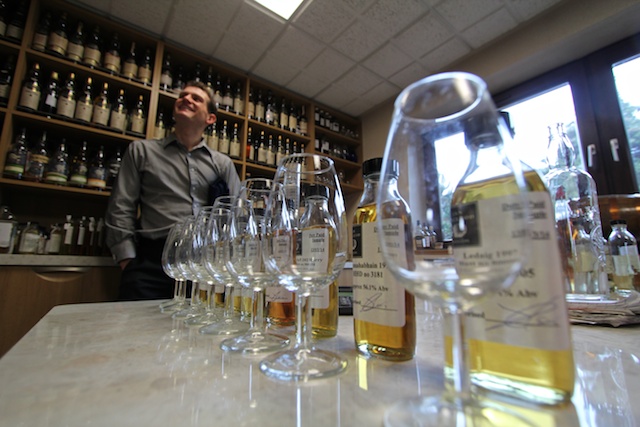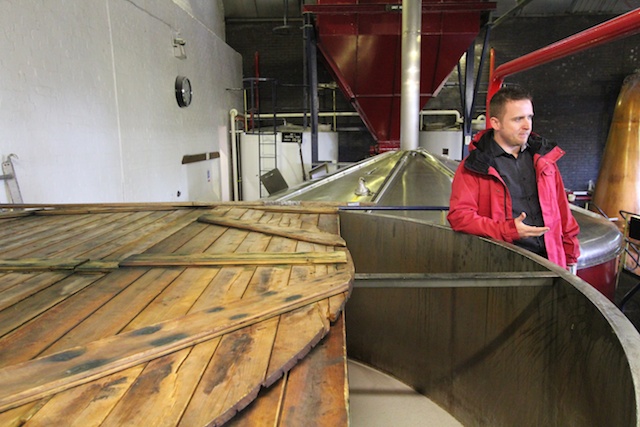Scotland 2013 - Day 6 - It's Who You Know

I think I've written this in every blog post so far this week, but I'll say it again now: our relationships are everything. We wouldn't be getting great whisky to bring back home if we hadn't met some incredible people over the past few years. We definitely wouldn't be bringing you all such fine specimen if we hadn't made an effort to keep these relationships strong and healthy. Last year we met David Stirk who runs a small operation south of Glasgow called the Exclusive Malts. He sold us four outstanding casks, three of which are already sold out (one of which was widely considered the best malt we've found in some time). At that point in time David didn't have any representation in the U.S., nor did he know anyone to help him. We introduced him to our friends Val and Sam at JVS and created a new relationship between friends. We love David. We love JVS. We're all friends. We're all doing business now.

While David and the Exclusive Malts will now have a presence in American stores outside of K&L, don't think our good buddy isn't holding a few secrets back for his old pals David & David. We tasted five slam-dunk whiskies at David's warehouse that will surely be five of the fastest selling whiskies at K&L come this Fall. Best of all, these will all be super value-priced whiskies. I don't think any of them will go for more than $70. They could be $60 or even less if we can really make this work.

One of the most surprising finds in David's stock was the presence of blended whisky. More importantly – vintage-dated blended whisky meaning that all of the whiskies in the blend were distilled the same year. Perhaps even more impressive than that: vintage-dated whisky from the 1970s. Yet even more exciting still: vintage-dated blended whisky from the 1970s at a very, very, very reasonable price. Faultline? You bet.
We had lunch with David after selecting our casks and we talked for a while about the independent bottling industry and the battle for superior casks happening at the moment. It's a crazy time to be here. Much like our cask-hunting business, it's literally about who you know in the independent game. David got his start because he had a friend at Diageo. That friend got him some very good casks out of Diageo's vast stocks. Those casks helped David create his bottling business and the rest is history. We met with a bottler last year outside of Edinburgh who had once bottled some amazing whiskies and we were hoping he could do some business with K&L. He brought some cask samples to dinner and they were total shit. When we asked him why these samples were not on par with his previous offerings, he told us that he used to have a close contact at Diageo, but that person had since passed away. No friend at Diageo = no booze. That made all the difference! One moment this man had a thriving independent business, the next he was out of business!
After a two hour drive through a beautiful forest with falling snow covering us in blanket of white, David and I have arrived in Newton Stuart, a small village in the far south of the country. If you look on a map you'll see that there's only one distillery anywhere near this place, so you can guess where we'll be headed tonight. Things are going to get interesting. Another brotherly battle is upon us. Can we unite the clans?
After all this talk I'm sure some of you are wondering how the independent bottling business continues to exist, especially considering that today's distilleries are running short on supply. I'll give you a brief explanation, followed by my own personal observation. When you distill whisky you're basically ten to fifteen years out from making any real profit because you have to wait for the whisky to mature. One way to make some money in the meantime is to sell it young. You might sell a barrel with some maturity, or you might offer an independent bottler a filling contract meaning that they can send their own empty barrels to be filled. These buyers will then sit on these barrels, usually paying you a warehousing fee each year for storage. When they're ready to bottle they'll come pick it up. In both cases, selling young whisky is a way to make some quick cash while you continue to save for the future. For the past several decades there have been periods of surplus, which also resulted in the sale of casks when distilleries were overburdoned with stock. Over the years, many independent operations have amassed quite a supply of barrels through numerous channels, which they now use to facilitate their own blends or to bottle as single barrel expressions. These are the people we usually visit when we come to Scotland.
Today, however, the game has changed somewhat. Scotch whisky is experiencing an unprecedented boom and the distilleries are scrambling to halt any sales of barrels and actually buy back the casks they may have sold over the past decade. When they're sitting in your warehouse it's easy to know what's available. Bruichladdich and Springbank are actually making offers to their private cask owners in an attempt to recoup their booze, as are many other small operations. Since mature barrels are pretty much off the market right now it means that getting a cask comes down to relationships, much like getting a bottle of Pappy Van Winkle from your local retailer. You might get lucky on the open market, but you'll probably have to make some inroads with someone who has access.
I'm wondering if the current freeze on cask sales (Diageo apparently has really put on the brakes) is perhaps also a new attempt to completely starve out the independents as well as secure future investments. I've watched the faces of a few corporate workers over the past few days when we mention our independently-purchased casks for K&L. They don't like it. Yesterday's customers are today's competitors. While the independents are competing with the big brands (who are the sole source of their whisky anyway!), there is further competition between the independents themselves. One person with access might be selling their booze too cheaply, causing problems for other cask owners who are looking to make their own profit. It's an all too familiar game as a retailer, but it's an interesting and exciting one!
-David Driscoll
